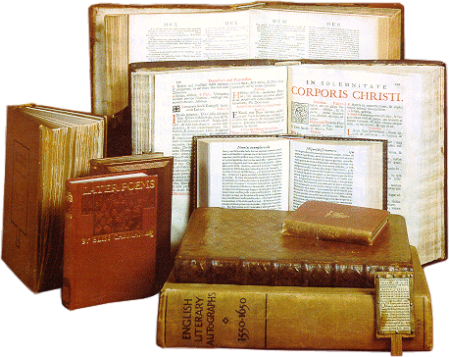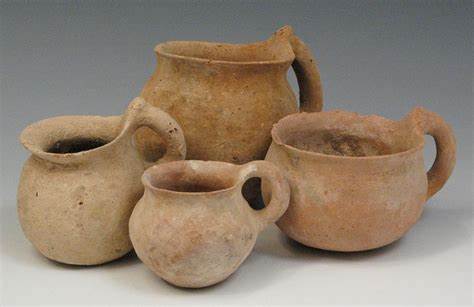Romans 9:19-29
Lesson 301
Read both the "King James Bible" and the "New Living Translation."
In this lesson:
The great potter (9:20-21).
Anger and mercy.
Gentiles are called, Jews are rejected.
The great potter (9:20-21).
Anger and mercy.
Gentiles are called, Jews are rejected.
Clay pottery from the Holy Land.
Who was -
Osee -
Osee is another name for the prophet Hosea (meaning salvation). Hosea was the son of Beeri (Hosea 1:1), a member of one of Israel's northern tribes, the author of the Old Testament book of Hosea, and one of the minor prophets from the 7th century BC. Hosea spoke out against Israel's wickedness and idolatry and warned the people to repent. As with so many Old Testament prophets, Hosea was largely ignored by the Jewish people. When Israel was defeated by Assyria, and many of its citizens carried off into slavery, Hosea prophesied that God would restore the nation (Hosea 1:10-11) and He would be worshipped by both Jews and Gentiles. See the Book of Hosea for more information.
Esaias -
Esaias is the Greek name for Isaiah (meaning Jehovah is salvation). Isaiah was an Old Testament prophet who died in 681 BC. Considered by many as the greatest Jewish prophet, Isaiah wrote "The Book of the Prophet Isaiah," which spoke out against hypocrisy (Isaiah 29:13) and idol worship ((Isaiah 2:6-9). In response to Isaiah's warnings, people prayed and made insincere religious sacrifices (Isaiah 1:10-17; 29:13) but refused to repent. Isaiah warned that God would punish them for their disobedience (Isaiah 3:1-26). Sure enough, Babylon destroyed Israel and carried its citizens away as slaves. Isaiah also prophesized that King Cyrus of Persia would allow the abducted Jewish people to return to Jerusalem 80 years before being taken captive and over 100 years before Cyrus was born. He also predicted that Cyrus would allow the rebuilding of the Temple before it had been destroyed. He prophesied the fall of Babylon 100 years before it rose and the coming of the Messiah (Isaiah 6:15; 7:14) 700 years before Christ's birth. The Bible does not tell us how or when Isaiah died. However, Jewish history reports that King Manasseh of Judah condemned Isaiah to death. Allegedly, he was found hiding in a hollow cedar tree and sawed in half with the tree. If this is true, then perhaps Hebrews 11:37 is referring to Isaiah. Isaiah is quoted over fifty times in the New Testament.
Osee -
Osee is another name for the prophet Hosea (meaning salvation). Hosea was the son of Beeri (Hosea 1:1), a member of one of Israel's northern tribes, the author of the Old Testament book of Hosea, and one of the minor prophets from the 7th century BC. Hosea spoke out against Israel's wickedness and idolatry and warned the people to repent. As with so many Old Testament prophets, Hosea was largely ignored by the Jewish people. When Israel was defeated by Assyria, and many of its citizens carried off into slavery, Hosea prophesied that God would restore the nation (Hosea 1:10-11) and He would be worshipped by both Jews and Gentiles. See the Book of Hosea for more information.
Esaias -
Esaias is the Greek name for Isaiah (meaning Jehovah is salvation). Isaiah was an Old Testament prophet who died in 681 BC. Considered by many as the greatest Jewish prophet, Isaiah wrote "The Book of the Prophet Isaiah," which spoke out against hypocrisy (Isaiah 29:13) and idol worship ((Isaiah 2:6-9). In response to Isaiah's warnings, people prayed and made insincere religious sacrifices (Isaiah 1:10-17; 29:13) but refused to repent. Isaiah warned that God would punish them for their disobedience (Isaiah 3:1-26). Sure enough, Babylon destroyed Israel and carried its citizens away as slaves. Isaiah also prophesized that King Cyrus of Persia would allow the abducted Jewish people to return to Jerusalem 80 years before being taken captive and over 100 years before Cyrus was born. He also predicted that Cyrus would allow the rebuilding of the Temple before it had been destroyed. He prophesied the fall of Babylon 100 years before it rose and the coming of the Messiah (Isaiah 6:15; 7:14) 700 years before Christ's birth. The Bible does not tell us how or when Isaiah died. However, Jewish history reports that King Manasseh of Judah condemned Isaiah to death. Allegedly, he was found hiding in a hollow cedar tree and sawed in half with the tree. If this is true, then perhaps Hebrews 11:37 is referring to Isaiah. Isaiah is quoted over fifty times in the New Testament.
Study Tip:
Think up your own chapter titles to describe the main topic in each passage.
Think up your own chapter titles to describe the main topic in each passage.




